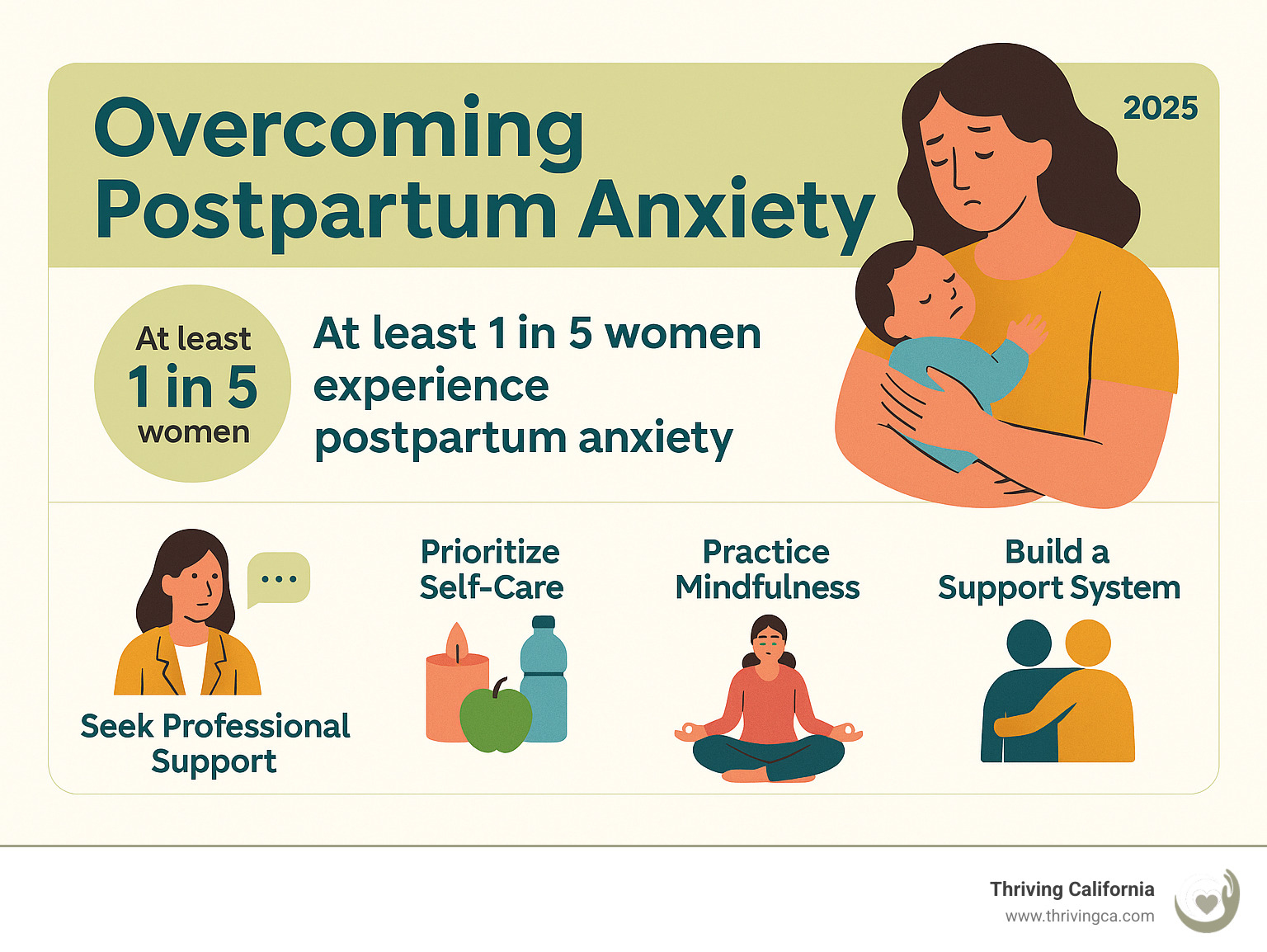Overcoming Postpartum Anxiety: Finding Your Path to Peace in Early Parenthood
The arrival of your new baby transforms everything. While you may have anticipated the joy and love that comes with a new baby, the intensity of excessive worry and anxious feelings that accompanies new parenthood can feel overwhelming. If you're experiencing racing thoughts, heart palpitations, or constant worry about your baby's health, you're facing something many new mothers and new parents throughout Napa, Lafayette, Thousand Oaks, and California experience silently. These physical symptoms and emotional symptoms aren't a reflection of your capabilities—they're symptoms of postpartum anxiety, a treatable condition affecting many women after giving birth.
At Thriving California, our group practice of doctoral-level clinicians specializes in helping parents navigate postpartum anxiety symptoms during this challenging postpartum period. Through our depth-oriented psychodynamic and relational therapy approaches, we help you understand and manage anxiety while addressing the deeper factors contributing to your anxious thoughts.
Understanding Postpartum Anxiety and Its Many Forms
Postpartum anxiety extends far beyond typical new-parent concerns. While some worry about your new baby is natural, postpartum anxiety creates persistent excessive anxiety that interferes with daily life. This condition, distinct from baby blues or postpartum depression, emerges from several factors unique to each person's experience.
Recognizing Common Signs and Symptoms of Postpartum Anxiety
The symptoms of postpartum anxiety manifest differently for each person. Physical symptoms often include racing heart, heart palpitations, shortness of breath, trouble sleeping even when the baby rests, sleep disturbances, muscle tension, and trouble sitting still. These sensations can trigger anxiety further, creating a challenging cycle.
Emotional symptoms include a constant sense of dread, excessive worry about your baby's health, panic attacks, and feeling emotionally disconnected. Many new mothers describe fearful thoughts and obsessive thoughts about potential dangers—worrying the baby might stop breathing or experiencing disturbing mental images. These unwanted thoughts feel horrifying precisely because they're opposite to your true desires.
Behavioral symptoms might include constantly checking your sleeping baby, avoiding situations that trigger anxiety, or being unable to delegate household chores or baby care to other parents or family members. This hypervigilance exhausts you while feeling necessary for safety.
Distinguishing Baby Blues, Postpartum Depression, and Anxiety
Understanding these distinctions helps you recognize when to seek treatment. Baby blues affect up to 80% of new mothers, involving mild mood swings lasting only two weeks. Postpartum depression involves excessive sadness, hopelessness, and loss of interest. Postpartum anxiety centers on excessive worry and fear.
Many women experience symptoms of both conditions simultaneously. Not everyone will experience both—symptoms vary widely among new mothers and other mothers facing these challenges.
Understanding Postpartum OCD and Panic Disorders
Beyond generalized postpartum anxiety, some parents develop postpartum obsessive compulsive disorder (postpartum OCD). This involves intrusive, unwanted thoughts paired with compulsive behaviors. Parents might experience obsessive thoughts about contamination or disturbing mental images, developing rituals to manage these anxious feelings.
Panic attacks—sudden episodes of intense fear with overwhelming physical symptoms—can also occur. These might happen when your baby cries inconsolably or during routine caregiving tasks. Understanding these as anxiety disorders rather than personal failings is crucial for recovery.

Risk Factors: Why Some Parents Develop Postpartum Anxiety
Developing postpartum anxiety often results from multiple risk factors converging. Understanding these helps normalize your experience and identify areas needing support.
Biological and Hormonal Changes
After giving birth, dramatic hormonal changes occur. Estrogen and progesterone levels plummet while cortisol remains elevated. These shifts directly impact neurotransmitters regulating mood, making you more vulnerable to anxiety symptoms. Sleep disturbances further compromise your ability to manage these changes.
Personal and Family History Factors
Your personal or family history significantly influences risk. Women with a history of anxiety disorders, obsessive compulsive disorder (OCD), or previous pregnancies with complications face higher risk. Those with family history of mental health challenges or health conditions may be more susceptible to postpartum anxiety symptoms.
First-time mothers navigating identity shifts, parents with multiple children managing increased demands, and those with perfectionist tendencies all face elevated risk. Previous traumatic experiences or lack of support from other parents and family members can intensify vulnerability.
Building Your Foundation: Coping Strategies and Skills
While professional mental health support often anchors recovery, evidence-based coping strategies provide daily relief from symptoms of postpartum anxiety. These coping skills help manage anxiety between therapy sessions.
Nourishing Your Body to Support Mental Health
The gut-brain connection significantly impacts anxious thoughts and feelings. During the postpartum period, focus on warm, nourishing foods that support neurotransmitter production. Omega-3 fatty acids, magnesium-rich foods, and complex carbohydrates help stabilize mood and reduce physical symptoms of anxiety.
Stay hydrated and mindful of substances that trigger anxiety. Caffeine can worsen heart palpitations and racing thoughts, while blood sugar fluctuations intensify anxious feelings. Small, consistent nutritional changes support your mental health significantly.
Movement and Breathing Exercises
Gentle movement helps manage anxiety without overwhelming your recovering body. Walking provides bilateral stimulation that naturally calms your nervous system. Practicing yoga offers additional benefits, combining movement with breath awareness to reduce anxiety symptoms.
Breathing exercises activate your parasympathetic nervous system, countering the physical symptoms of panic attacks. Box breathing—inhaling, holding, exhaling, and pausing for equal counts—can quickly shift your body from anxious to calm. These techniques provide immediate relief when excessive worry threatens to overwhelm.
Sleep and Rest Strategies
While new baby care disrupts sleep, addressing sleep disturbances remains crucial for managing postpartum anxiety. Coordinate with partners or family members to secure longer sleep stretches. Even if trouble sleeping persists, resting your body helps regulate stress hormones contributing to anxiety disorders.
In mild cases of postpartum anxiety, improving sleep alone can significantly reduce symptoms. However, when anxiety causes persistent trouble sleeping despite opportunities for rest, professional support becomes essential.

Creating Support Systems: You Don't Have to Face This Alone
Isolation intensifies postpartum anxiety symptoms. Building connections with other mothers, family members, and mental health professionals creates the support network essential for recovery.
Empowering Partners and Family Members
Clear communication helps loved ones provide meaningful additional support. A family member who understands symptoms of postpartum anxiety can offer specific help rather than generic assistance. Partners can take responsibility for household chores, allowing you to rest or seek treatment.
Educating support people about postpartum OCD, panic attacks, and other anxiety disorders helps them respond appropriately to your needs. When they understand that obsessive thoughts and fearful thoughts are symptoms requiring compassion, not judgment, they provide better support.
Connecting with Other Parents
Finding other mothers experiencing anxiety normalizes your experience. Online communities and local groups offer understanding from those managing similar symptoms. Hearing other parents voice identical unwanted thoughts or describe their own racing thoughts dismantles shame.
These connections remind you that many women successfully overcome postpartum anxiety. Their stories provide hope when excessive worry feels insurmountable.

Professional Treatment at Thriving California
Sometimes coping strategies and peer support aren't sufficient for managing severe postpartum anxiety symptoms. Recognizing when you need a mental health professional demonstrates wisdom and strength.
When to Seek Professional Help
Consider reaching out if you experience symptoms lasting beyond two weeks, panic attacks interfering with daily life, obsessive compulsive disorder symptoms, persistent negative thoughts, or if anxiety affects your ability to care for your new baby. Trust your instincts—if managing anxiety feels impossible alone, seek treatment.
Healthcare providers can help determine appropriate treatment options. While we don't prescribe medications like selective serotonin reuptake inhibitors (SSRIs), we support clients who choose to explore medication with their doctors as part of comprehensive treatment.
Our Specialized Therapeutic Approach
At Thriving California, our doctoral-level clinicians bring expertise in treating postpartum anxiety, postpartum depression, and related conditions. Our psychodynamic and relational approach explores how your health history, family history, and life experiences contribute to current symptoms.
We help new mothers understand connections between past experiences and present anxious thoughts. This insight-oriented work addresses root causes, not just symptoms, creating lasting change beyond temporary coping strategies.
For those in Napa who experienced birth trauma, we offer specialized treatment using somatic resourcing and bilateral stimulation. This focused approach helps process traumatic birth experiences, reducing associated anxiety symptoms.
What to Expect in Treatment
Our intake process begins with a free consultation to ensure we're the right fit. We discuss your symptoms of postpartum anxiety, previous pregnancies if relevant, and current challenges. If we're not appropriate for your needs, we provide referrals to other mental health professionals.
During therapy, we explore factors contributing to your excessive worry and fearful thoughts. We examine how previous experiences, societal pressures, and identity shifts influence your anxiety. Some clients focus on current stressors, while others explore childhood experiences affecting their parenting anxiety.
We don't assign homework or use rigid protocols. Instead, we follow your lead while offering gentle guidance and suggestions for managing anxiety between sessions. This flexible approach honors the unpredictability of life with a new baby.
Daily Management Strategies for Postpartum Anxiety
While working with our therapists, these techniques provide ongoing relief from postpartum anxiety symptoms:
Grounding Techniques for Anxious Thoughts
When racing thoughts or obsessive thoughts intensify, grounding brings you back to the present. The 5-4-3-2-1 technique—identifying things you see, touch, hear, smell, and taste—interrupts anxiety spirals. This simple practice helps when fearful thoughts about your baby's health overwhelm you.
Challenging Negative Thoughts
Notice when thoughts spiral into catastrophe. Ask: Is this thought accurate? Helpful? What would I tell another mother experiencing this worry? Understanding thought patterns helps you recognize when anxiety, not reality, drives your fears.
Physical Awareness
Anxiety manifests through physical symptoms—tension, shallow breathing, heart palpitations. Regular body scans help you notice and release tension before it escalates into panic attacks. This awareness prevents anxiety from building throughout your day.
Managing Specific Anxiety Challenges
Different aspects of postpartum anxiety require targeted approaches:
Intrusive Thoughts and Postpartum OCD
If you experience unwanted thoughts or mental images about harm, remember these are symptoms of anxiety disorders, not your desires. These thoughts occur precisely because they oppose your values. Working with our therapists helps you understand and manage these distressing symptoms without judgment.
Panic Attacks and Acute Anxiety
When panic attacks occur, remember they're temporary despite feeling overwhelming. Breathing exercises, grounding techniques, and reminding yourself of safety can help. Our therapy explores triggers and develops personalized strategies for managing these intense episodes.
Sleep-Related Anxiety
Many new parents develop anxiety about sleep—both their own and their baby's. Fear that the baby might stop breathing keeps you hypervigilant. We help you distinguish realistic concerns from anxiety-driven fears, developing strategies for rest despite worry.

The Journey Forward: Hope and Healing
Recovery from postpartum anxiety isn't linear. Some days bring relief, others feel challenging. This variability is normal for anxiety disorders and doesn't indicate failure. Each step—trying new coping skills, accepting support from family members, working with a mental health professional—moves you toward healing.
At Thriving California, we understand that not everyone experiences postpartum anxiety identically. Whether you're in Napa dealing with birth trauma and postpartum OCD, in Lafayette managing panic attacks and excessive worry, in Thousand Oaks navigating postpartum depression alongside anxiety, or anywhere in California seeking telehealth support, our group practice offers specialized care.
Our psychodynamic approach addresses why you're experiencing anxiety, not just teaching coping strategies. We explore how your personal or family history, health conditions, previous pregnancies, and current circumstances contribute to symptoms. This deeper understanding creates lasting change, helping you thrive in parenthood.
Many women worry that experiencing anxiety means they're failing as mothers. Nothing could be further from the truth. Seeking help for postpartum anxiety demonstrates love for your family and commitment to wellness. With appropriate treatment options and support, you can overcome these challenges.
Taking the First Step
If you recognize signs of postpartum anxiety in yourself—the excessive worry, physical symptoms, obsessive thoughts, or panic attacks—know that help exists. You don't have to navigate this alone or in silence. The anxious feelings and fearful thoughts you're experiencing are symptoms of a treatable condition, not reflections of your worth or capability as a parent.
Overcoming postpartum anxiety is possible. Through our specialized therapy, combined with coping strategies and support from other mothers and family members, you can find peace and presence in parenthood. You deserve to experience joy with your new baby without the shadow of constant anxiety.
Ready to begin healing? Contact Thriving California for your free consultation. Let's explore how our specialized approach can help you manage anxiety and discover the confident, calm parent within you. Whether through in-person sessions or telehealth throughout California, we're here to support your journey from surviving to thriving in parenthood.


